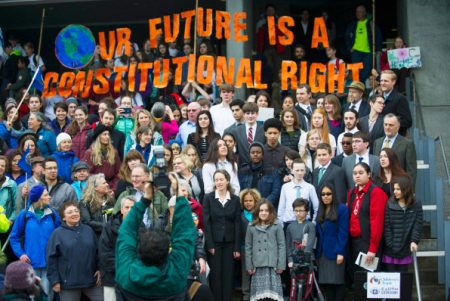April 11, 2017 – A climate lawsuit launched by 21 youth in the State of Oregon charges the United States federal government with violating the essential rights embedded in the Declaration of Independence and Constitution. The suit argues that a healthy climate system is an essential right that protects life, liberty, and property. If the suit succeeds it could upend all of President Donald Trump’s current executive actions to roll back the environmental initiatives of the previous Obama administration.
The suit pre-dates Trump’s presidency with the plaintiffs, who today are between the ages of 9 and 20, claiming that even under President Obama, promotion of fossil fuel production and attendant greenhouse gas emissions was a violation of the public trust arguing that government has a responsibility to protect the environment and ensure a healthy climate for the public’s use. So far no judge has quashed the lawsuit despite the fossil fuel industry and the new Trump administration’s attempts to have the case go away.
An attorney for the plaintiffs, Philip Gregory, argues “Neither this Congress or this administration are prepared to take the difficult steps to achieve the climate targets that science requires…..Like the civil rights cases from the ’50s and ’60s when the school districts wouldn’t integrate the schools and Congress and the state legislatures wouldn’t pass legislation, children there turned to the courts. And here, these 21 kids turned to the courts because there really is no other place for them to go.”
The plaintiffs are hoping that other young people launch similar lawsuits to air their grievances over government inaction on climate change. And on that note, a 9-year old girl in India is taking the federal government to court for failing to act on climate change, and for the government’s contribution to the environmental degradation of the country. India has set up a special court for environmental cases called the National Green Tribunal. Ridhima Pandey, the petitioner in the suit argues that the Indian government has failed to implement its environment laws. Her petition states that the government needs to be directed “to take effective, science-based action to reduce and minimize the adverse impacts of climate change.” The Ministry of Environment and Central Pollution Control Board are both named in the suit and have been instructed to respond to the tribunal within two weeks.
Ridhima joins six teenagers who in 2016 filed a petition with the tribunal over air pollution in the city of New Delhi. Ridhima has requested that the court instructs the government to prepare a carbon budget and national climate recovery plan.
India, today, is home to 4 of the 10 worst cities for air pollution. Along with China, they have been cited as responsible for half of all global deaths blamed on poor air quality. India has a poor record on forest management and has seen in the north landslides and floods caused by deforestation and leading to hundreds of deaths and thousands of families left homeless.
Back in the United States, upon President Trump’s inauguration, the youth plaintiffs requested that the Department of Justice ensure that all information records on climate change, and greenhouse gas emissions, in all departments of government, be preserved for use in court. This request came just as new appointees of the incoming administration started removing website information on climate from government agencies. This behaviour continues to go on with the latest, the Department of Energy, removing all references to climate change from its information web pages available to the public.
The Trump administration has challenged the case raised by the youth stating that “preservation of documents itself represents a burden on the government.” To describe web content from a prior administration as a “burden” is a remarkable claim. Web pages can easily be archived indefinitely, and at the current price point for web storage of data and documents, the cost, described as a burden, is far less in a year than the costs associated with President Trump’s numerous weekend and golf visits to his Mar-a-Lago “Southern White House” since his inauguration.
The case of these young people in India and the United States follows a successful suit brought against the government of the Netherlands by 900 of its citizens who argued that its legislators and executive were not doing enough to address climate change; a Peruvian farmer who sued his government seeking damages from the loss of Andes glaciers as a water source because of climate change; a Pakistan court ruling against its government for a lack of climate change action; and 17 states governments in the United States who have been investigating the fossil fuel industry for lies told the public and investors about their industry’s contributions to climate change.












